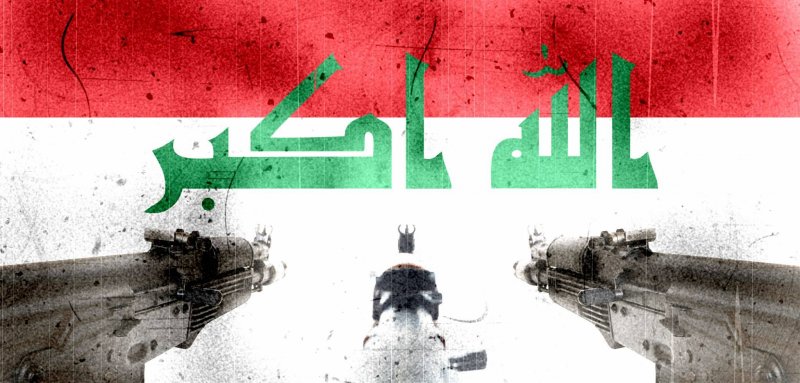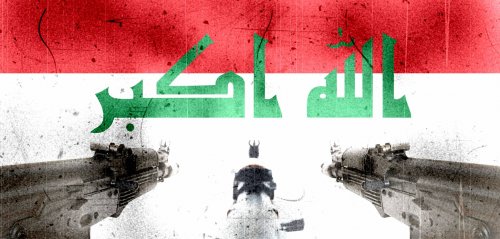The results of the October 10 Iraqi legislative elections have not been satisfactory to the Fatah Alliance, a coalition of parties with armed factions in the Hashd al-Sha’abi (also known as the Popular Mobilization Forces).
The coalition headed by Hadi al-Amiri won 14 seats, down from 48 seats in the previous elections!
While the number of deputies for the Fatah Alliance diminished, the number of deputies of the Sadrist bloc led by the leader of the Sadrist Movement, Muqtada al-Sadr, increased from 54 in the previous assembly to 73, according to the preliminary results announced by the Independent High Electoral Commission (IHEC).
Al-Sadr, the People, and the “Militia”
These results prompted al-Sadr to deliver a strongly-worded speech, in which he spoke of the “militias” and said that “the people have triumphed over them,” a statement that experts and analysts interpreted as targeting the Fatah Alliance.
The Fatah Alliance had been an ally of al-Sadr in forming the government of Adel Abdul-Mahdi, which resigned on November 30 of 2019.
Al-Sadr also stressed that “weapons must be confined to the hands of the state, and the use of arms outside that framework is prohibited, even for those who claim to be from the resistance and those like it,” alluding to the factions that support the Fatah Alliance.
The decline that befell the Fatah Alliance — which is the political wing of a large number of armed factions — has created a state of anxiety in Iraq during the past hours, especially after “Abu Ali al-Askari”, a senior security official in the Kata’ib Hezbollah (or the Hezbollah Brigades), threatened to “take a stance against the electoral process”.
Not only that, but al-Askari, whose identity remains anonymous, called on all “resistance factions to prepare for a sensitive stage ahead,” but he did not elaborate further. However, sources close to “resistance factions” told Raseef22 that “all options are on the table, and whoever stole the votes of the people must bear the consequences of their actions.”
Al-Askari saw that these election results were “targeting” the Hashd al-Sha’abi, and stated, “Those who want seats in the House of Representatives must make up their minds and prepare to defend their entity in full.”
On the evening of Tuesday, October 12, Mazen al-Zaidi, a writer and journalist close to the Fatah Alliance and the “resistance factions”, wrote on Twitter that “the coordination of the resistance factions is holding a meeting that has been described as important and decisive in the early evening.”
He added, “The meeting will come up with unprecedented positions regarding the election results and their implications, and will include open and clear messages to all internal and external parties.”
A source in the Fatah Alliance disclosed to Raseef22, “The process of targeting us began when the Hashd al-Sha’abi was prevented from taking part in the special vote, and this went on until the results were announced.”
Observers believe that “resistance factions” will enter into a major conflict in the coming days, and may change the direction of their guns, which were previously directed at US targerts, to other places
The Hashd al-Sha’abi, which the Fatah Alliance had been relying on to win votes, was not included in the special voting process, which included Iraqi security forces, displaced persons, and prisoners. Their votes were lost in the general ballot, since not all of their members were able to participate due to having military duties during that time.
The Independent High Electoral Commission (IHEC) justified its position at the time by stating that it “requested that the Hashd al-Sha’abi Authority send a list of its members’ names to include them in the special vote, but they did not send it,” in the words of commision spokeswoman Jumana al-Ghalay.
On this story, political sources tell Raseef22 that “the Fatah Alliance, led by the leaders of the armed factions, did not want to be involved in the statement of the true number of members of the Hashd al-Sha’abi due to the presence of corruption cases, so it was forced to refrain from sending the names of its members to the Commission, because sending them would reveal the true number of the Authority’s affiliates,” and those who receive their salaries from the Iraqi state. But others attribute this to reasons related to maintaining the security of these factions.
A Recount?
With the announcement of the preliminary results, information leaked about a visit by Esmail Qaani, the commander of the Iranian Quds Force, to Baghdad. But 24 hours later, Iran’s ambassador to Iraq, Iraj Masjedi, denied such reports.
The information indicated that Qaani met with the leaders of the factions and the leaders of the Fatah Alliance to discuss the election results. Hours after it was leaked, a statement from a committee called the “Coordination Framework” — which includes armed factions and Shiite political parties — was released, questioning the election results. About an hour later, “Abu Ali al-Askari” issued his strongly worded statement.
After results were announced, Muqtada al-Sadr felt there were new looming developments, so he delivered his so-called “strong” speech confirming his bloc won 73 seats, a message against any attempt to manipulate results
The threats made by the “armed factions” suggest a change in stances. After al-Fatah’s position had been political, this was reinforced by the stances of the armed parties, and even went further than that. Its leader, al-Amiri, said in press statements, “We do not accept these fabricated results, whatever the price, and we will defend the votes of our candidates and voters with full force.”
After the results were announced, al-Sadr felt that something was amiss, and that there were new looming developments, so he came out to deliver his speech — which was described as “strong” — and to confirm that his bloc had won 73 seats, and perhaps more, as a message against any attempt to manipulate the announced results.
During the past 36 hours, the role of the Independent High Electoral Commission seemed befuddled, as the results were not fully announced, although it is legally obligated that it be announced within 24 hours, and its website stopped the moment of announcement.
The commission stated on Tuesday evening that “there are 3,100 polling stations whose votes have not yet been counted, and they constitute 6% of the votes cast.”
The head of the commission, Jalil Adnan, hinted during a press conference held on Tuesday evening to the possibility of a change in the results, as well as the possibility that the ballot boxes would be completely counted manually, which is what the Iraqi “resistance factions” have demanded.
“These results are only preliminary and not final,” Adnan said. He repeated this sentence three times in about seven minutes, until observers described it to be a prelude to a recount and a new sorting.
Observers believe that the “resistance factions” will enter into a major conflict in the coming days, and may change the direction of their guns — which have been directed at US bases and its embassy — to other places.
Raseef22 is a not for profit entity. Our focus is on quality journalism. Every contribution to the NasRaseef membership goes directly towards journalism production. We stand independent, not accepting corporate sponsorships, sponsored content or political funding.
Support our mission to keep Raseef22 available to all readers by clicking here!
Interested in writing with us? Check our pitch process here!






